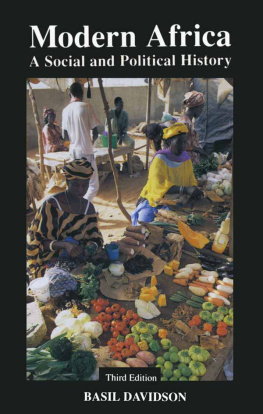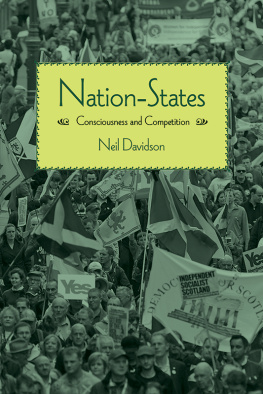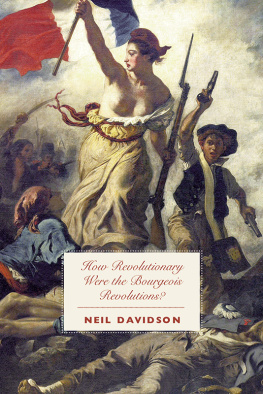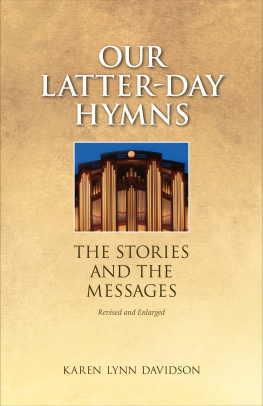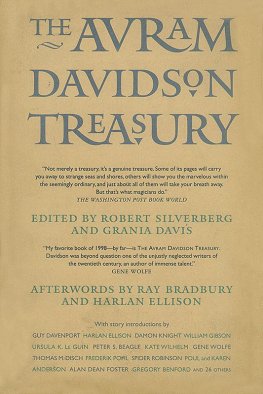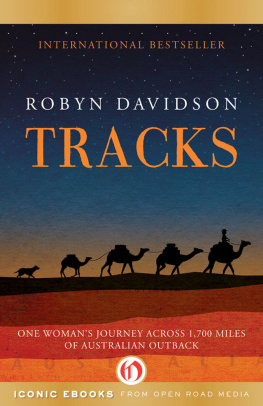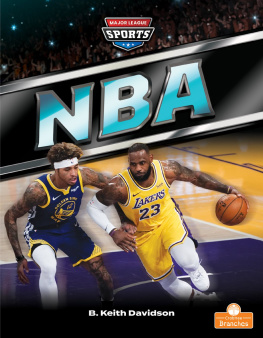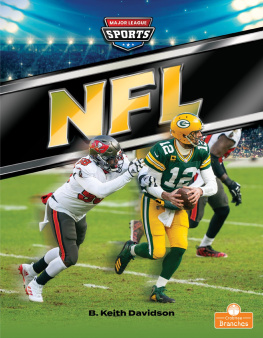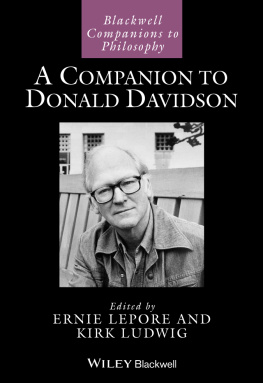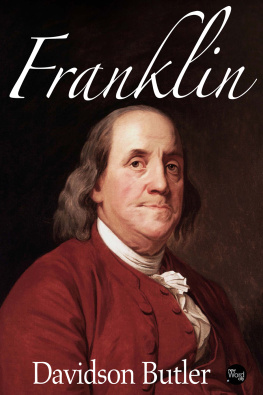Davidson - Modern Africa
Here you can read online Davidson - Modern Africa full text of the book (entire story) in english for free. Download pdf and epub, get meaning, cover and reviews about this ebook. publisher: Taylor & Francis (CAM), genre: Politics. Description of the work, (preface) as well as reviews are available. Best literature library LitArk.com created for fans of good reading and offers a wide selection of genres:
Romance novel
Science fiction
Adventure
Detective
Science
History
Home and family
Prose
Art
Politics
Computer
Non-fiction
Religion
Business
Children
Humor
Choose a favorite category and find really read worthwhile books. Enjoy immersion in the world of imagination, feel the emotions of the characters or learn something new for yourself, make an fascinating discovery.
Modern Africa: summary, description and annotation
We offer to read an annotation, description, summary or preface (depends on what the author of the book "Modern Africa" wrote himself). If you haven't found the necessary information about the book — write in the comments, we will try to find it.
Modern Africa — read online for free the complete book (whole text) full work
Below is the text of the book, divided by pages. System saving the place of the last page read, allows you to conveniently read the book "Modern Africa" online for free, without having to search again every time where you left off. Put a bookmark, and you can go to the page where you finished reading at any time.
Font size:
Interval:
Bookmark:
MODERN AFRICA
Modern Africa A Social and Political History
Third Edition
Basil Davidson

First published 1983 by Pearson Education Limited
Second Edition 1989
Third Edition 1994
Published 2013 by Routledge
2 Park Square, Milton Park, Abingdon, Oxon OX14 4RN
711 Third Avenue, New York, NY 10017, USA
Routledge is an imprint of the Taylor & Francis Group, an informa business
Copyright 1993, 1989, Taylor & Francis.
This edition Basil Davidson 1994
All rights reserved. No part of this book may be reprinted or reproduced or utilised in any form or by any electronic, mechanical, or other means, now known or hereafter invented, including photocopying and recording, or in any information storage or retrieval system, without permission in writing from the publishers.
Notices
Knowledge and best practice in this field are constantly changing. As new research and experience broaden our understanding, changes in research methods, professional practices, or medical treatment may become necessary.
Practitioners and researchers must always rely on their own experience and knowledge in evaluating and using any information, methods, compounds, or experiments described herein. In using such information or methods they should be mindful of their own safety and the safety of others, including parties for whom they have a professional responsibility.
To the fullest extent of the law, neither the Publisher nor the authors, contributors, or editors, assume any liability for any injury and/ or damage to persons or property as a matter of products liability, negligence or otherwise, or from any use or operation of any methods, products, instructions, or ideas contained in the material herein.
ISBN 13: 978-0-582-21288-6 (pbk)
British Library Cataloguing-in-Publication Data
A catalogue record for this book is available from the British Library
Library of Congress Cataloging-in-Publication Data
Davison, Basil, 1914
Modern Africa: a social and political history/Basil Davidson.3rd ed.
p. cm.
Includes bibliographical references and index.
ISBN 0-582-21288-X
1. Africa-History18841985. 2. AfricaHistory1985
I. Title.
DT29.D384 1994
| 960.3dc20 | 933815 CIP |
Set by 15 in 10/12 Monophoto Bembo
I have written this book chiefly for students and others who are preparing for a variety of intermediate and senior level examinations, and who need a general but reliable understanding of the modern history of Africa.
Designed for use with more detailed national or local histories, it presents these histories within the framework of an all-African overview of events, movements, ideas, dates and personalities between about 1914 and 1990.
But while the book concentrates on the wide range of subjects and themes required for full examination coverage, I hope that teachers, college students and other readers will find here a useful and stimulating narrative and synthesis.
Carrying this history to the threshold of the 21st Century, I have again enlarged Modern Africa in this Third Edition, and brought it up to date from previous editions.
Basil Davidson
studies changes and developments in the years 19141930. Among questions examined in its chapters are:
The Early Years of the Twentieth Century
What was the colonial partition?
How did the First World War (19141918) affect Africans?
Colonial Africa: to 1930
How did the colonial systems work?
Who paid for them, and how?
What did the colonial systems do to African land, labour, and trade?
African Responses: to 1930
What was colonial pacification?
Who were the early leaders of anti-colonial protest?
What were the Ethiopianist and other religious movements?
What was the migrant labour system, and how did it work?
Who were the educated few, and why were they important?
Key Ideas for Progress
Who began the Pan-African movement, and why?
How did the ideas of modern nationalism begin and spread in Africa?
What was the National Congress of British West Africa, and what is the African National Congress of South Africa?
What was the policy of assimilation?
How did nationalism take shape in North Africa? Who were the early leaders of Islamic nationalism?
What were the Salajiyyah, the Wafd, the Destour, the Etoile Nord-Africaine?
Africa is probably the oldest continent. Most of it consists of ancient rocks which have changed little in structure since they first took shape some 200 million years ago. Still larger than the Africa of today, that most ancient continent has been named Gondwanaland. Huge fragments then broke away from Gondwanaland and became India, Australia, and South America. This is the explanation of the theory known as continental drift.
Whether or not this theory is right, Africa can certainly claim to be the birthplace of mankind. Science in the past half-century has shown that the earliest ancestors of ourselves evolved in Africa, and, from Africa, spread around the world in developing the various branches of mankind that we know today.
Africa's own civilisations are seen to have developed from the onset of the Neolithic or New Stone Age some 10,000 years ago. Their most important region of early development was the vast plainland of the Sahara before it began drying to a desert. From the plainland of the green Sahara, as it then was, the black peoples multiplied and spread, eventually creating the great civilisations of Pharaonic Egypt and the Nile Valley.
Elsewhere, across the vast tropical and southern regions of the continent the black peoples of ancient times progressed from one phase of development to another. They introduced cattle. They invented methods of growing food-crops under tropical conditions. After about 500 BC they began smelting and forging iron for tools. They tamed their difficult continent. At the same time they evolved their own religious and social beliefs, methods of self-government, and ways of keeping the peace.
All this has had to be done against the problems of an often very hostile ecology and climate. Not only is Africa big so big that the whole of the USA could be contained within it several times over but Africa is also a continent of great natural variation. Most of it stretches between the latitudes of 35 North and 35 South of the Equator. Within this huge area there are countless differences of rainfall, soil fertility, plant and animal life; and each of these differences has challenged the survival of mankind. That survival has required a constant self-adjustment. Nothing has been easy; nothing has been guaranteed.
But a new challenge to the black peoples, a different kind of challenge offering new opportunities but bringing new dangers, began some 500 years ago. That was when the outside world largely, the European world first reached the African scene in a direct and frequent way. This new contact with Europe brought gains to Africa as well as to Europe, especially in the exchange of goods and ideas. But it also brought the long and painful tragedy of the trans-Atlantic trade in Africans captured into slavery and sent to the Americas. This was helpful for the development of the Americas, but very bad for the development of Africa. And this slave trade lasted more than 300 years.
Next pageFont size:
Interval:
Bookmark:
Similar books «Modern Africa»
Look at similar books to Modern Africa. We have selected literature similar in name and meaning in the hope of providing readers with more options to find new, interesting, not yet read works.
Discussion, reviews of the book Modern Africa and just readers' own opinions. Leave your comments, write what you think about the work, its meaning or the main characters. Specify what exactly you liked and what you didn't like, and why you think so.

